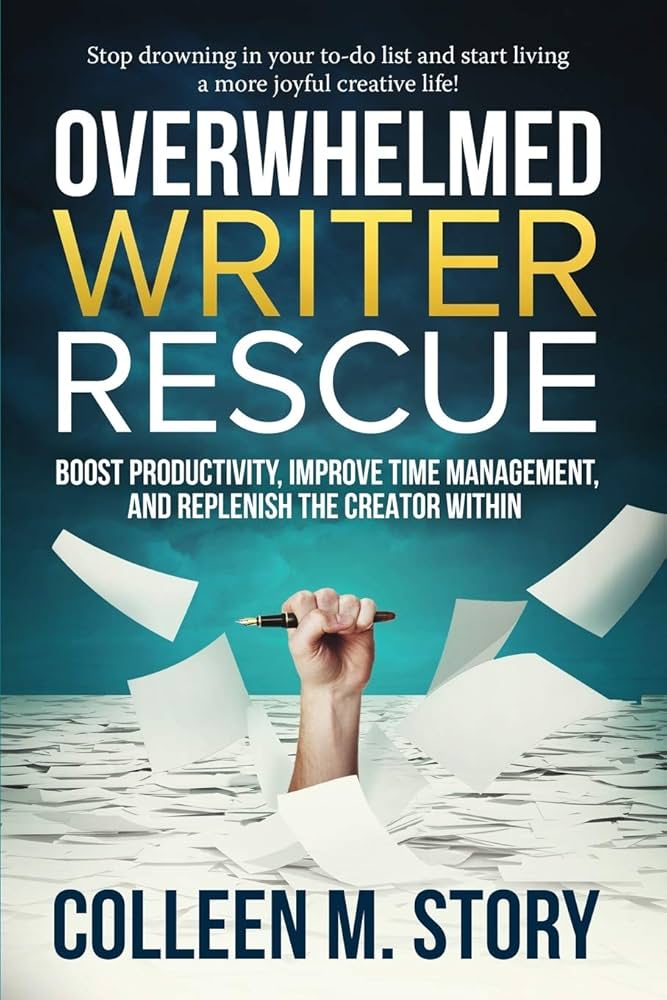Time management is crucial for writers. Balancing creativity and deadlines can be tough.
Effective time management helps writers stay productive and meet goals. Many writers struggle to organize their time, leading to stress and missed deadlines. By implementing simple strategies, writers can find more time for creativity and reduce stress. This introduction will explore the importance of time management for writers.
We will look at how it can improve productivity and reduce burnout. Writers can benefit from structured routines and clear goals. Stay tuned for practical tips to manage time better and achieve writing success.

Credit: www.helpingwritersbecomeauthors.com
Setting Clear Goals for Time Management
Setting clear goals is essential for writers. Goals provide direction and motivation. They help keep track of progress and maintain focus. Clear goals ensure that you meet deadlines and complete projects.
Daily Writing Targets
Daily writing targets are important for steady progress. These targets can vary based on your writing style and schedule. Here are some tips:
- Set a specific word count. For example, aim for 500 words each day.
- Choose a time of day to write. Morning or evening, whatever suits you best.
- Create a dedicated writing space. This helps reduce distractions.
Having daily targets keeps you on track. It makes writing a habit. Small daily goals lead to big achievements over time.
Long-term Objectives
Long-term objectives give your writing a sense of purpose. They help in planning and prioritizing tasks. Consider these long-term goals:
| Goal | Description |
|---|---|
| Complete a Novel | Finish writing a 70,000-word novel in one year. |
| Publish Articles | Publish 10 articles in reputable magazines within six months. |
| Start a Blog | Launch and maintain a blog with weekly posts for a year. |
Long-term objectives should be realistic and achievable. They require planning and regular check-ins. Break these goals into smaller tasks. This makes them manageable and less daunting.
Setting clear goals, both daily and long-term, ensures consistent progress. It makes writing more structured and less stressful. Focus on what you can achieve each day and keep your long-term vision in mind.
Creating A Writing Schedule
Creating a writing schedule is essential for writers. It helps in managing time effectively and ensures regular writing habits. A well-structured schedule can boost productivity and creativity. Let’s explore how to create one.
Finding Your Peak Hours
Everyone has specific times when they are most productive. Identify your peak hours. Are you a morning person? Or do you write better at night? Track your writing habits for a week. Note when you feel most focused and creative.
Once you find your peak hours, block them for writing. Protect this time from distractions. This will help you produce your best work.
Balancing Writing With Other Tasks
Writers often juggle many responsibilities. You may have other tasks like research, editing, or marketing. Create a balanced schedule. Allocate time for each task. Don’t let writing consume all your time.
Set realistic goals. Break your work into small tasks. This makes it easier to manage. Use tools like calendars or apps to organize your tasks. Stay consistent. A balanced schedule keeps you productive and less stressed.
Eliminating Distractions
Eliminating distractions is crucial for writers who want to boost productivity. Distractions can come in many forms. They can be digital, physical, or mental. By reducing these interruptions, writers can focus better and write more efficiently. This section explores two effective strategies: designing a focus-friendly workspace and using productivity tools.
Designing A Focus-friendly Workspace
Your workspace impacts your ability to concentrate. Start by decluttering your desk. A clean space helps clear your mind. Ensure your chair and desk are comfortable. Good posture reduces fatigue and pain. Natural light boosts mood and energy. If possible, place your desk near a window. Add personal touches that inspire you. A picture or a plant can make a big difference. Keep necessary tools within reach. This reduces the need to get up frequently. Silence or background music? Choose what helps you focus better.
Using Productivity Tools
Productivity tools can help manage time and tasks. Use a timer app for focused writing sessions. The Pomodoro technique is popular. Write for 25 minutes, then take a 5-minute break. Repeat this cycle. Task management apps keep you organized. List your writing tasks for the day. Check them off as you complete them. Writing apps with distraction-free modes can be helpful. They provide a full-screen writing experience. This minimizes on-screen distractions. Browser extensions can block distracting websites. Limit social media access during writing hours.
Prioritizing Tasks to Use Time Properly
Time management is crucial for writers. Prioritizing tasks helps you focus on what matters. It ensures you meet deadlines and maintain high-quality work. Understanding which tasks need attention first can make your workflow smoother.
Urgent Vs. Important
Knowing the difference between urgent and important tasks is key. Urgent tasks need immediate attention. They often have tight deadlines. Important tasks contribute to long-term goals. They may not need immediate action but are crucial.
Use the Eisenhower Matrix to categorize tasks:
| Urgent | Not Urgent | |
|---|---|---|
| Important | Do these tasks first. They are top priority. | Schedule these tasks. They are important but not immediate. |
| Not Important | Delegate these tasks. They are urgent but not important. | Eliminate these tasks. They are neither urgent nor important. |
Effective To-do Lists
An effective to-do list can make a big difference. Here are some tips:
- Break tasks into small steps.
- Focus on three to five tasks per day.
- Use bullet points for clarity.
- Check off completed tasks for a sense of achievement.
Consider using digital tools like Todoist or Evernote. They help you organize tasks efficiently.
Remember, prioritizing tasks is about finding balance. Focus on what truly matters. Manage your time wisely. This helps you become a more productive writer.
Overcoming Writer’s Block
Overcoming writer’s block is a common challenge for many writers. It can be frustrating and demotivating. But, there are ways to manage and overcome it. With the right techniques and mindset, you can break free from the block and get back to writing.
Brainstorming Techniques
Brainstorming is a powerful tool to overcome writer’s block. Start by jotting down any ideas that come to mind. Don’t worry about grammar or structure. Just let your thoughts flow freely. Create mind maps to organize your ideas. This visual approach can help you see connections and spark new thoughts.
Another technique is freewriting. Set a timer for 10 minutes and write non-stop. Don’t edit or censor yourself. This can help you bypass mental blocks and uncover hidden ideas. Try using prompts to kickstart your creativity. Prompts provide a starting point and can lead to unexpected inspiration.
Mindfulness And Relaxation
Mindfulness can help you overcome writer’s block. Take a few minutes to meditate. Focus on your breath and clear your mind. This practice can reduce stress and improve concentration. It helps you approach writing with a calm, focused mind.
Relaxation techniques are also beneficial. Take breaks during your writing sessions. Go for a walk, stretch, or listen to music. These activities can refresh your mind and provide new perspectives. Ensure you get enough sleep. A well-rested mind is more creative and productive.

Credit: writetodone.com
Managing Multiple Projects
Managing multiple writing projects can seem overwhelming. With proper strategies, writers can balance projects effectively. This section offers practical tips for managing various writing tasks without stress.
Project Segmentation
Divide each project into smaller tasks. This approach helps in maintaining focus and tracking progress. Here’s a simple method:
- Outline the main goals.
- Break down the goals into smaller tasks.
- Set deadlines for each task.
For example, if you’re working on a novel:
| Task | Deadline |
|---|---|
| Outline the plot | Week 1 |
| Develop characters | Week 2 |
| Write Chapter 1 | Week 3 |
Delegation And Collaboration
Work on multiple projects with others. This can lighten the load and improve productivity. Consider these points:
- Identify tasks that can be delegated.
- Choose team members with the right skills.
- Set clear expectations and deadlines.
- Use Project management tool
Collaboration tools can be very helpful. Some popular options include:
- Trello for task management.
- Slack for communication.
- Google Docs for shared writing and editing.
Effective collaboration and delegation can make managing multiple projects easier.
Maintaining Work-life Balance
Writers often struggle to maintain a healthy work-life balance. The pressure to meet deadlines can lead to long hours and exhaustion. Finding balance is crucial for both productivity and well-being. Below are some strategies to help maintain this balance.
Setting Boundaries
Setting clear boundaries between work and personal time is essential. Define specific hours for writing and stick to them. Inform family and friends about your work schedule. This helps minimize interruptions.
Having a dedicated workspace can also help. Use this space only for writing tasks. This creates a mental separation between work and relaxation. Avoid working in areas where you usually relax, like the bed or couch.
Self-care Strategies
Self-care is vital for maintaining work-life balance. Take regular breaks during writing sessions. A short walk or some stretching can refresh your mind and body.
Make sure to get enough sleep. Lack of sleep affects your productivity and mood. Eating healthy meals at regular intervals also supports your overall well-being.
Engage in hobbies or activities you enjoy outside of writing. This helps to recharge your creativity and reduce stress. Remember, a balanced life improves your writing quality.

Credit: cmarshallpublishing.com
Leveraging Writing Tools
Time management for writers is crucial. Leveraging writing tools can make a big difference. These tools help writers stay organized and focused. Here are some effective writing tools to consider.
Software And Apps
Various software and apps can assist in improving your writing process. Here are some popular choices:
| Tool | Function |
|---|---|
| Scrivener | Helps in organizing notes, research, and writing. |
| Grammarly | Checks grammar, spelling, and punctuation. |
| Evernote | Allows note-taking and task management. |
| Trello | Helps in organizing tasks and projects. |
Using these tools can save you time. They also improve the quality of your work.
Traditional Tools
Traditional tools also play a vital role. Many writers still prefer them for various reasons.
- Notebooks: A handy tool for jotting down ideas quickly.
- Planners: Useful for scheduling and tracking your writing progress.
- Sticky Notes: Great for quick reminders and organizing thoughts.
These tools are simple, yet effective. They provide a tangible way to stay organized.
Tracking Progress
Effective time management for writers involves not just planning and execution, but also consistently tracking progress. Tracking your progress ensures you’re on the right path and helps you stay motivated. It allows you to identify areas of improvement and make necessary adjustments. Here, we focus on three key aspects: Regular Reviews and Adjusting Strategies.
Regular Reviews
Regular reviews are crucial for any writer. They help you understand how much you’ve achieved and what remains. Make it a habit to review your progress weekly or monthly. During these reviews, assess the quantity and quality of your work.
- Check if you met your writing goals.
- Evaluate the effectiveness of your writing schedule.
- Identify any distractions that hindered your productivity.
Regular reviews provide insights into your writing patterns. This helps you understand your strengths and weaknesses. It also keeps you motivated by showing how much you’ve accomplished.
Adjusting Strategies
After reviewing your progress, you may find areas that need improvement. This is where adjusting strategies come in. If a particular method isn’t working, don’t hesitate to change it.
- Try different writing schedules.
- Experiment with new writing tools.
- Set realistic and achievable goals.
Adaptation is key. Adjusting your strategies ensures you remain productive and on track. It prevents you from feeling stuck and keeps your writing process dynamic.
| Review Frequency | Actions to Take |
|---|---|
| Weekly | Check progress, identify distractions |
| Monthly | Evaluate goals, adjust strategies |
Tracking progress is not a one-time task. It’s an ongoing process that ensures continuous improvement. Regular reviews and adjusting strategies are vital steps in this journey.
Frequently Asked Questions
How Can Writers Improve Time Management?
Writers can improve time management by setting clear goals, creating a daily schedule, and minimizing distractions. Using time-blocking techniques and prioritizing tasks can also help. Regularly evaluating and adjusting your workflow ensures continued efficiency.
What Tools Help Writers Manage Time?
Tools like Trello, Asana, and Pomodoro timers help writers manage time effectively. These tools aid in task organization, project tracking, and maintaining focus. Utilizing productivity apps can significantly enhance your writing efficiency.
How Does Time Blocking Benefit Writers?
Time blocking helps writers by allocating specific time slots for focused writing. This method reduces procrastination and increases productivity. It ensures dedicated time for writing, research, and breaks, leading to better work balance.
Why Is Goal Setting Important For Writers?
Goal setting is important for writers as it provides direction and motivation. Clear goals help track progress and maintain focus. Achieving set goals boosts confidence and productivity in writing tasks.
Conclusion
Effective time management helps writers stay productive and focused. Prioritize tasks and set clear goals. Break work into smaller, manageable chunks. Use tools like calendars and timers. Avoid distractions and stick to a schedule. Regular breaks can refresh your mind.
Consistent practice improves writing efficiency. Implementing these strategies can lead to better results. Writing becomes less stressful and more enjoyable.




